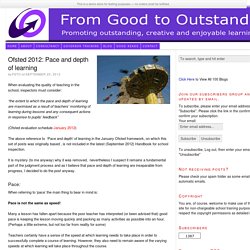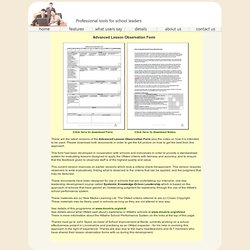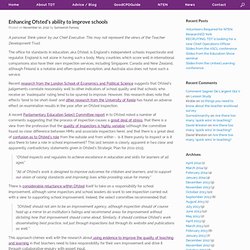

Ofsted2012: Pace and depth of learning — From Good to Outstanding. When evaluating the quality of teaching in the school, inspectors must consider: “the extent to which the pace and depth of learning are maximised as a result of teachers’ monitoring of learning during lessons and any consequent actions in response to pupils’ feedback” (Ofsted evaluation schedule January 2012) The above reference to ‘Pace and depth’ of learning in the January Ofsted framework, on which this set of posts was originally based , is not included in the latest (September 2012) Handbook for school inspection.

It is mystery (to me anyway) why it was removed, nevertheless I suspect it remains a fundamental part of the judgment process and as I believe that pace and depth of learning are inseparable from progress, I decided to do the post anyway. Pace: When referring to ‘pace’ the main thing to bear in mind is: Pace is not the same as speed! Teachers certainly have a sense of the speed at which learning needs to take place in order to successfully complete a course of learning. C2_5_1_pg.pdf (application/pdf Object) 4Matrix. Advanced Lesson Observation Form Click here to download Form Click here to download Notes These are the latest versions of the Advanced Lesson Observation Form plus the notes on how it is intended to be used.

Please download both documents in order to get the full picture on how to get the best from this approach. This form had been developed in cooperation with schools and individuals in order to provide a standardised system for evaluating lessons designed to apply the Ofsted criteria with fairness and accuracy, and to ensure that the feedback given to observed staff is of the highest quality and value.
This current version improves on earlier versions which took a criteria check list approach. These materials are (c) New Media Learning Ltd. Thanks must go to John Taylor, ex-head of School Improvement at Becta, currently working on a school effectiveness project in Lincolnshire and practising as an Ofsted inspector - for his help in evolving this approach in the light of experience. Notes on the new Ofsted framework: how to be outstanding.
I've recently been working with the magnificent @HeatherLeatt who has been apportioned with the task of training all of our teaching staff through the new Ofsted framework.

Alongside the goalpost changes (this is the only political reference in the article) we have identified our own priorities in the classroom for the school. On the whole, these are consistently the same year-on-year with a few coming and going according to a changing environment. So, no real surprises. However, with the latest framework, probably just like everyone else, we are all now redefining what is 'outstanding' according to the new framework.
We have championed strategies that encourage sharing of good practice and are ever-increasingly popular through online forums that I network with. So, if you are a teacher and unfamiliar with the headline Ofsted changes that affect you directly in the classroom, using what knowledge I have, allow me to share with you some of the latest Ofsted gems. Judgements Teaching. Enhancing Ofsted’s ability to improve schoolsTeacher Development Trust. A personal ‘think-piece’ by our Chief Executive.

This may not represent the views of the Teacher Development Trust. The office for standards in education, aka Ofsted, is England’s independent schools inspectorate and regulator. England is not alone in having such a body. Many countries which score well in international comparisons also have their own inspection services, including Singapore, Canada and New Zealand, although Finland is a notable and often-quoted exception, and Australia also does not have such a service. Recent research from the London School of Economics and Political Science suggests that Ofsted’s judgements correlate reasonably well to other indicators of school quality and that schools who receive an ‘inadequate’ rating tend to be spurred to improve.
“The Education Inspectorate should see as part of its mission a role to support the development of robust self and peer evaluation through appropriate partnerships. Supplementary_subject-specific_guidance_for_science.pdf (application/pdf Object) Ofsted: teachers packing lessons with 'bite-sized' exercises.